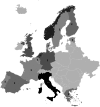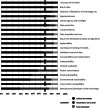Health technology assessment framework for artificial intelligence-based technologies
- PMID: 39568412
- PMCID: PMC11703629
- DOI: 10.1017/S0266462324000308
Health technology assessment framework for artificial intelligence-based technologies
Abstract
Objectives: Artificial intelligence (AI)-based health technologies (AIHTs) have already been applied in clinical practice. However, there is currently no standardized framework for evaluating them based on the principles of health technology assessment (HTA).
Methods: A two-round Delphi survey was distributed to a panel of experts to determine the significance of incorporating topics outlined in the EUnetHTA Core Model and twenty additional ones identified through literature reviews. Each panelist assigned scores to each topic. Topics were categorized as critical to include (scores 7-9), important but not critical (scores 4-6), and not important (scores 1-3). A 70 percent cutoff was used to determine high agreement.
Results: Our panel of 46 experts indicated that 48 out of the 65 proposed topics are critical and should be included in an HTA framework for AIHTs. Among the ten most crucial topics, the following emerged: accuracy of the AI model (97.78 percent), patient safety (95.65 percent), benefit-harm balance evaluated from an ethical standpoint (95.56 percent), and bias in data (91.30 percent). Importantly, our findings highlight that the Core Model is insufficient in capturing all relevant topics for AI-based technologies, as 14 out of the additional 20 topics were identified as crucial.
Conclusion: It is imperative to determine the level of agreement on AI-relevant HTA topics to establish a robust assessment framework. This framework will play a foundational role in evaluating AI tools for the early diagnosis of dementia, which is the focus of the European project AI-Mind currently being developed.
Keywords: AI-HTA framework; AI-Mind Study; artificial intelligence; health technology assessment; value assessment.
Conflict of interest statement
The authors declare that the research was conducted in the absence of any commercial or financial relationships that could be construed as a potential conflict of interest.
Figures




References
-
- Ma B, Yang J, Wong FKY, et al. Artificial intelligence in elderly healthcare: A scoping review. Ageing Res Rev. 2023;83:101808. - PubMed
-
- Organisation for Economic Co-operation and Development (OECD). [Internet] Updates to the OECD’s definition of an AI system explained [cited 2023 Dec 20]. 2023. Available from: https://oecd.ai/en/wonk/ai-system-definition-update.
-
- Organisation for Economic Co-operation and Development (OECD). [Internet] Recommendation of the Council on Artificial Intelligence [cited 2023 Dec 20]. 2019. Available from: https://oecd.ai/en/assets/files/OECD-LEGAL-0449-en.pdf.
-
- Estevez Almenzar M, Fernandez Llorca D, Gomez Gutierrez E, Martinez Plumed F. Glossary of human-centric artificial intelligence. Luxembourg: Publications Office of the European Union; 2022.
MeSH terms
LinkOut - more resources
Full Text Sources

